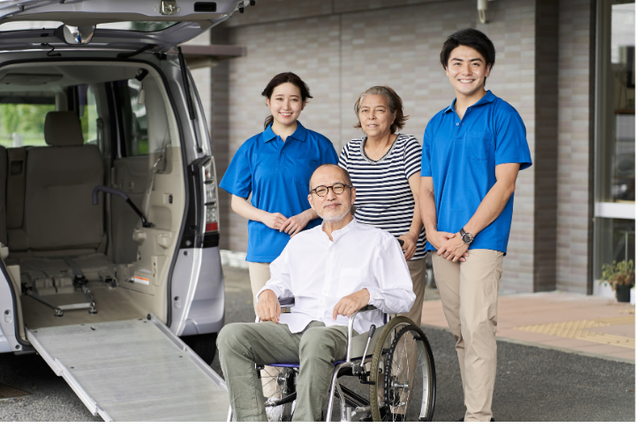Available and Affordable Medical Transport Options for Seamless Wellness Support
In the world of health care, the availability and affordability of medical transportation are vital in making certain individuals can access the treatment they require when they require it. The capacity to effortlessly navigate transportation choices can substantially impact an individual's capability to receive prompt medical focus, follow-up care, and total wellness. From non-emergency clinical transport services to innovative solutions like telehealth, the landscape of clinical transportation is developing to meet the varied needs of patients. Considering the significance of this aspect in health care delivery, checking out the range of alternatives available comes to be necessary for attending to spaces in access and price.
Non-Emergency Medical Transport Provider

These services are staffed by qualified experts that focus on person convenience and safety during transit. Drivers are geared up to manage people with differing clinical demands and make certain that all trips are smooth and hassle-free - Medical Transportation Services Near Me. In addition, non-emergency medical transportation services frequently use specific lorries that are wheelchair-accessible, making them suitable for a large range of clients with different mobility needs
Volunteer Chauffeur Programs
Volunteer motorist programs contribute in offering transportation support for individuals in demand of non-urgent clinical treatment. These programs rely upon the generosity of volunteers who contribute their time and automobiles to assist transport people to and from clinical visits. By using volunteer chauffeurs, organizations can supply a cost-effective option for individuals who may not have access to trusted transport.
Among the vital benefits of volunteer chauffeur programs is the customized care and attention that people get. Unlike conventional transport services, volunteer drivers usually establish a rapport with the people they assist, producing a caring and supportive setting during what can be a demanding time. Furthermore, volunteer driver programs can aid connect the void for individuals living in underserved or rural areas where mass transit choices may be restricted.
Public Transport Options

One of the essential benefits of public transport is its prevalent availability in rural and metropolitan locations alike. This comprehensive network permits patients from diverse histories to take a trip to medical visits with family member simplicity. Additionally, mass transit systems are typically geared up to fit people with handicaps, giving accessible travel choices for those with flexibility challenges.

Ride-Sharing and Transport Network Firms
The development of contemporary transportation choices for clinical functions prolongs past standard public systems like trains and buses to incorporate the cutting-edge world of ride-sharing and transport network companies. Ride-sharing services such as Uber and Lyft have actually view it revolutionized the method people travel to medical consultations, providing ease and flexibility to clients that may not have access to their vehicles or conventional public transport. These platforms allow users to request an experience with the touch of a switch on their smart devices, providing door-to-door service that can be specifically useful for people with movement obstacles or those needing aid.
Transportation network business (TNCs) have actually likewise played a considerable function in linking the void navigate to these guys in clinical transportation services. Business like Veyo and RoundTrip concentrate on non-emergency clinical transportation, providing to people who require a greater level useful during their trips to medical facilities. By partnering with doctor and insurance firms, TNCs ensure that patients can access trusted and prompt transport services, inevitably contributing to boosted health and wellness end results and client complete satisfaction.
Telehealth and Digital Assessments
Enhancing medical care availability and convenience, telehealth and online consultations have actually emerged as pivotal components in modern clinical practices, changing the means patients engage with healthcare providers. Telehealth leverages modern technology to assist in remote interaction between clients and medical care professionals, providing a vast array of services such as online appointments, remote monitoring, and electronic prescriptions. Online appointments enable clients to seek medical suggestions, medical diagnosis, and treatment from the comfort of their homes, getting rid of the demand for physical visits to medical care centers. This approach not only saves time and minimizes transport costs for people however also boosts the general effectiveness of medical care delivery.
Moreover, telehealth plays a crucial role in prolonging medical services to underserved areas, backwoods, and individuals with minimal wheelchair. By breaking down geographical obstacles and boosting healthcare outreach, telehealth advertises very early intervention, connection of care, and client interaction. As innovation continues to advance, telehealth is poised to play a progressively considerable role in shaping the future read review of healthcare distribution, fostering better health end results and client complete satisfaction.
Verdict

From non-emergency clinical transportation services to cutting-edge remedies like telehealth, the landscape of medical transport is evolving to satisfy the varied requirements of clients.Non-Emergency Medical Transportation Services facilitate the prompt and risk-free transport of individuals requiring non-urgent clinical care to and from medical care centers.The development of modern transport choices for clinical functions extends past standard public systems like buses and trains to incorporate the ingenious realm of ride-sharing and transport network companies.Transport network companies (TNCs) have actually likewise played a significant duty in bridging the void in medical transport services. Non-Emergency Medical Transport Services, Volunteer Chauffeur Programs, Public Transport Options, Ride-Sharing and Transportation Network Companies, and Telehealth and Virtual Consultations all play an important duty in dealing with transport barriers to medical care access.
 Jason J. Richter Then & Now!
Jason J. Richter Then & Now! Jonathan Lipnicki Then & Now!
Jonathan Lipnicki Then & Now! Barry Watson Then & Now!
Barry Watson Then & Now! Meadow Walker Then & Now!
Meadow Walker Then & Now! Sarah Michelle Gellar Then & Now!
Sarah Michelle Gellar Then & Now!